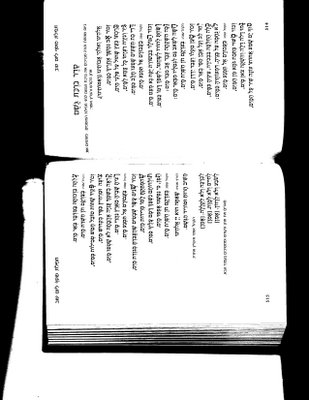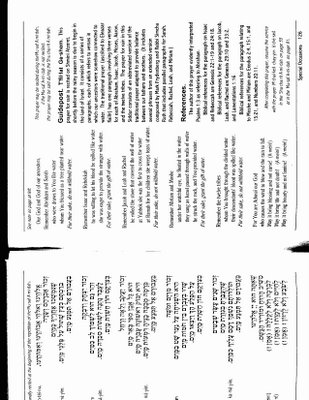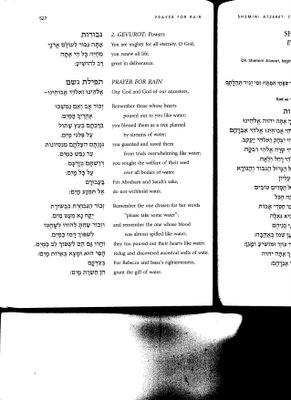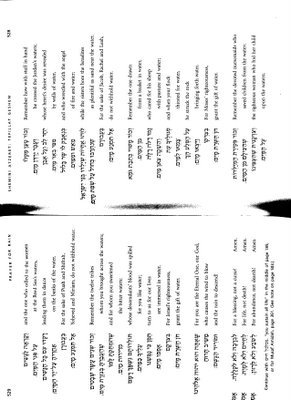Be sure to check out the versions available online, linked to in Zack's original post:
- "Geshem: Verses for our mothers" by Mark Frydenberg;
- an egalitarian version of Geshem by Rabbi Yoram Mazor of the Movement for Progressive Judaism in Israel (which ZShB praised as "closer in poetic spirit to the original")
Happy Sukkot (and/or Ramadan, full harvest moon, belated Feast of Saint Francis, etc.) to all!
Edit:
okay, this is a very not-clever way of doing things, but here's a JPEG of the text by Rabbi Dr. Gil Nativ, from the aforementioned Israeli Masorti siddur Va'ani Tefilati. Apologies for the bad orientation: I'm still not sure how to do much with things I scan, etc. -- but at least this way you can save it on your computer, manipulate it to face the correct way, etc. [RB note: I now have an English translation for this Hebrew--which has now been officially accepted for use in my minyan; please see the end of this post!*]

...and here's a JPEG of the version from Siddur Eit Ratzon (it cuts off the transliteration column, but it's got the complete Hebrew text & English translation; you can contact me if you want a PDF or JPEG of the cut-off page area; it says that it is based on the text by Mark Frydenberg):

and finally, the version from the attractively-laid out interlinear Siddur Hadesh Yameinu (from Congregation Dorshei Emet, the Reconstructionist Synagogue of Montreal; I do not know the attribution for its newly-composed elements & would welcome more information to give cresit where it is due!)):


And here's an English composition I've just been made aware of:
A congregant of mine created her own English egalitarian additions to the tefilat Geshem. I forward them for those who might be interested, with her permission.
-- Josh Hammerman
TEFILLAT GESHEM – THE MISSING VERSES
By: Karen Hayworth Hainbach
REMEMBER SARAH
Lively, lovely eyes, clear as aqua water
Amid two harems, she stayed pure as water
She greeted passers-by with food and water
Her laughter bubbled as a spring of water
Congregation: For Sarah’s sake, send water!
REMEMBER RIVKA
She kindly sated man and beast with water
Guided by faith elemental as water,
She transposed twins, at odds as oil and water,
Switching Isaac’s blessing, precious as water
Congregation: For Rivka’s sake, bless us with water!
REMEMBER LEAH
Spurned, soft eyes burned by tears like salty water,
Sustained by faith deep as a well of water,
Fertile as a field, surfeited with water,
She praised God, thanks overflowing like water
Congregation: For Leah’s sake, favor us with water!
REMEMBER RACHEL
She met her husband by a well of water
He yearned for her as sabras thirst for water
Her children exiled to Babylon’s water,
Her tears cascaded as a fall of water
Congregation: For Rachel’s sake, comfort us with water!
REMEMBER MIRYAM
Miryam the Prophet, named for bitter water,
Protected Moses’ basket in the water
Timbrel in hand, she danced beside the water
In her merit, you sent the well of water
Congregation: For Miryam’s sake, provide us with water!
REMEMBER THE DAUGHTERS OF ISRAEL
They shunned the Calf - their virtue shone like water;
Gave copper mirrors, reflective as water,
To fashion the Mishkan’s laver of water;
And monthly dunked in mikvas’ cleansing water
Congregation: For their sake, shower us with water!
November 2004
* Thanks for Rabbi Leonard Berkowitz for providing me with this translation:
Geshem Prayer
for Rain
From Masorti Siddur Va'ani Tefillati, 1998
additional verses by Rabbi Gil Nativ
Translation: Rabbi Robert Scheinberg
Our God and God of our ancestors:
a Remember our father (AV), whose heart poured out to You like water;
b You blessed (BERACHTO) him, as a tree planted near water;
g He and his beloved drew near (GIYER) all who were thirsty for water;
d At age ninety, from her breasts (DADIM) milk flowed like water;
For the sake of Abraham and Sarah, do not withhold water!
h Remember the one (HANOLAD) whose birth was foretold as the angels drank water;
v You instructed (VESACHTA)
his father to spill his blood like water;
z The meritorious one (ZAKAH) gave the father's servant to drink from a pitcher of water;
h She hurried (CHASHAH) to draw also for his camels from the well of water;
For the sake of Isaac and Rebekah, grant the gift of water!
t Remember the one who took (TA'AN) his staff and crossed the Jordan's water;
y He gathered his heart (YICHED) and rolled the stone from the well of water;
k A bride (KALAH) switched with her elder, whose eyes were like water;
l She was not (LO) comforted over her sons; her tears were like water;
For the sake of Jacob, Rachel, and Leah, do not withhold water!
n Remember the one drawn forth (MASUI) in a bulrush basket from the water;
n They said (NAMU), "He drew water and provided the sheep with water."
s On the Sea of Reeds (SUF), he heard his sister lead a song at the water;
a In the desert there arose (ALTAH) on her behalf a well of water.
For the sake of Moses and Miriam, grant the gift of water!
p Remember the one appointed (PAKID) over the Temple, who would immerse himself five
times in water;
t He went (TZO'EH) to cleanse his hands with the sanctification of water;
q The poor one called (KAR'AH) out Your name; her love for You could not be
extinguished by water;
r You accepted (RATZITA) her returnees from the land of rivers of water.
For the sake of Zion and her Temple, do not withhold water!
sh Remember the twelve (SHNEMASAR)
tribes of Israel, whom You brought through the
water;
sh You sweetened (SHEHIMTAKTA)
the brackish marsh for their sake into sweet water.
t For You their descendants' (TOLDOTAM) blood was spilled like water.
t Turn to us (TEFEN) for
our souls are engulfed like water!
For all of Israel's sake, grant the gift of water!
For you are Adonai our God
who causes the wind to blow and the rain to fall
For blessing and not for curse (Amen)
For life and not for death (Amen)
For abundance and not for scarcity (Amen)
